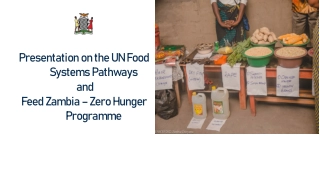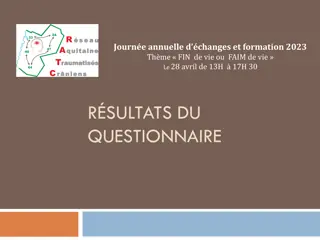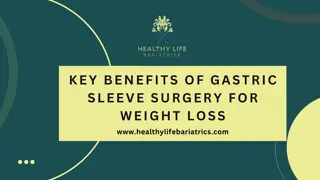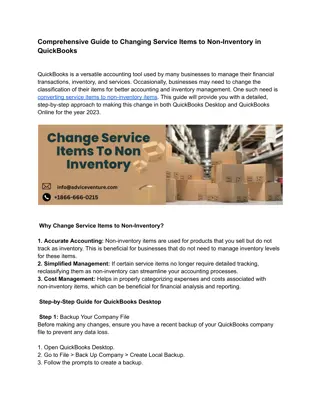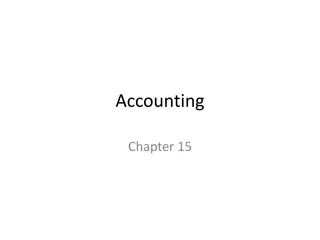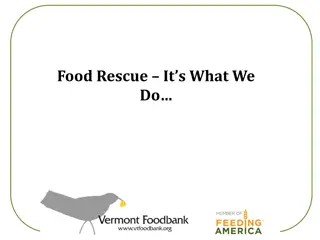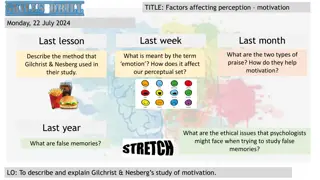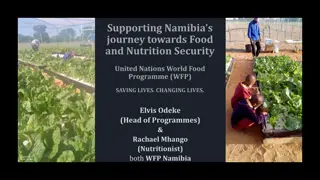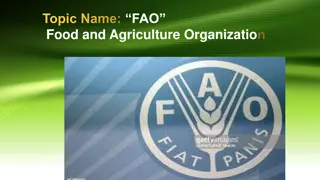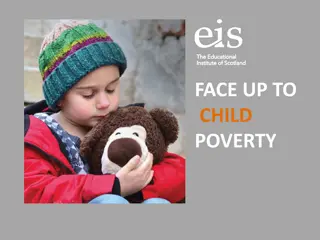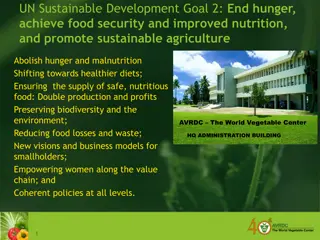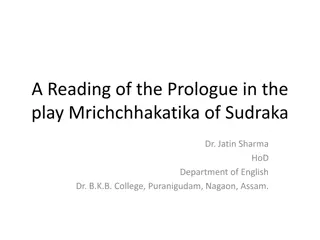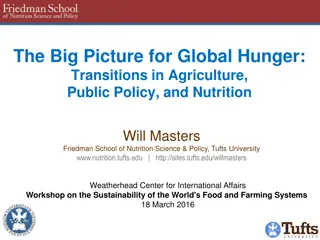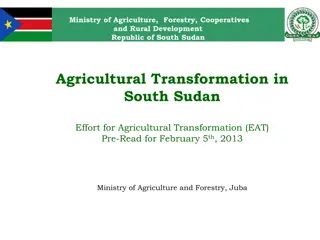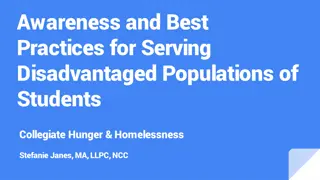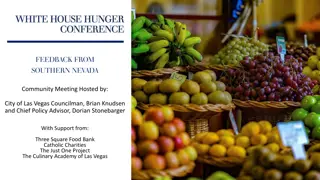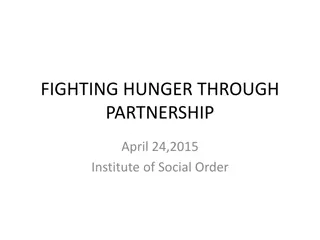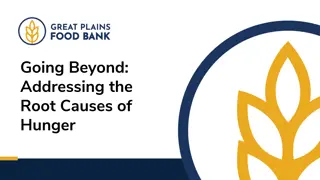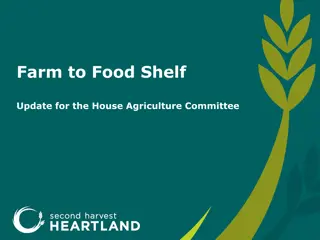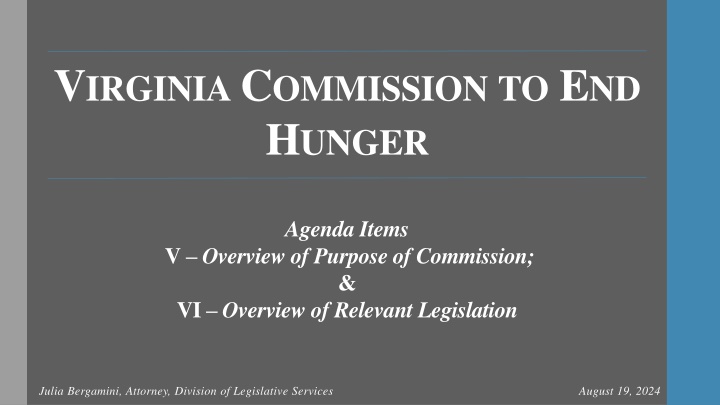
Virginia Commission to End Hunger Agenda Overview
The Virginia Commission to End Hunger aims to develop an action plan every two years to combat hunger, ensure access to nutritious meals in public schools, identify funding sources, address food access barriers, and promote public-private partnerships. The commission also reviews relevant legislation related to food insecurity, including initiatives such as offering free school meals statewide.
Uploaded on | 1 Views
Download Presentation

Please find below an Image/Link to download the presentation.
The content on the website is provided AS IS for your information and personal use only. It may not be sold, licensed, or shared on other websites without obtaining consent from the author. If you encounter any issues during the download, it is possible that the publisher has removed the file from their server.
You are allowed to download the files provided on this website for personal or commercial use, subject to the condition that they are used lawfully. All files are the property of their respective owners.
The content on the website is provided AS IS for your information and personal use only. It may not be sold, licensed, or shared on other websites without obtaining consent from the author.
E N D
Presentation Transcript
VIRGINIACOMMISSION TO END HUNGER Agenda Items V Overview of Purpose of Commission; & VI Overview of Relevant Legislation Julia Bergamini, Attorney, Division of Legislative Services August 19, 2024
ITEM V: Overview of Commission Purpose HB 607 (Del. Price) (2024). Established for the purpose of . . . Developing an action plan every two years for ending hunger in the Commonwealth; reviewing the progress of such plan; and ensuring cross collaboration among government entities and community partners toward the goal of ending hunger in the Commonwealth. 2
ITEM V: Overview of Commission Purpose Objectives. Identify funding sources over which the state has administrative control that could be used for improving nutrition and ending hunger; Identify strategies for ensuring each public school student has access to nutritious meals and snacks at school, including by promoting full participation in all federally assisted school meal and snack programs; Identify barriers to food access and develop sustainable policies and programs to address such barriers; Promote and facilitate public-private partnerships; and Develop benchmarks and set goals to indicate success. 3
ITEM VI: Overview of Relevant Legislation. Overview of legislation related to food insecurity in the Commonwealth from the preceding three sessions (2024, 2023, and 2022): Categories (i) Education (public primary and secondary schools and public institutions of higher education); (ii) Health, Welfare, and Social Services; and (iii) Miscellaneous 4
ITEM VI: Relevant Legislation Education. SB 283 (Sen. Roem): Free school meals; work group to study offering to students statewide (2024). (Passed) Summary as Passed: Requires the Superintendent of Public Instruction, in coordination with the Secretary of Education, to convene a stakeholder work group to: (i) Study the estimated impact of offering free school meals to students statewide; (ii) Identify options for reducing or eliminating student and school meal debt; (iii) Make recommendations on options for leveraging other programs funded at the state and federal levels for the provision of student school meals; and (iv) Report its findings and recommendations to the Joint Subcommittee on Elementary and Secondary Education Funding by November 1, 2024. 5
ITEM VI: Relevant Legislation Education; SB 283, cont. Similar/Identical Legislation: each is identical/similar to SB 283 as introduced, see summary below Identical: HB 686 (Del. Bennett-Parker) (2024) Failed Similar: HB 1967 (Del. Mullin) (2023) Failed Summary as Introduced: (i) Requires each school board to require each school in the school division to participate in the federal National School Lunch and Breakfast Programs or in the Community Eligibility Provision (CEP) and make lunch and breakfast available to any student who requests a meal at no cost to the student; (ii) Requires the Department of Education to reimburse each public school for each breakfast and lunch served to a student; and (iii) Establishes the same work group as in the bill as passed. 6
ITEM VI: Relevant Legislation Education, cont. HB 827 (Del. Cousins): State Council of Higher Education for Virginia; survey on campus food insecurity; report (2024). (Passed) Summary as Passed: Requires the State Council of Higher Education for Virginia to: (i) Survey each public institution of higher education to determine how each institution is addressing on-campus food insecurity; (ii) Compile and make available to each such institution a guidance document containing best practices for leveraging all available resources and opportunities; and (iii) Report its findings and any recommendations to the Chairmen of the House Committee on Appropriations, the House Committee on Education, the Senate Committee on Education and Health, and the Senate Committee on Finance and Appropriations no later than November 1, 2024. 7
ITEM VI: Relevant Legislation Education; HB 827, cont. Similar/Identical Legislation:all similar/identical to HB 827 as introduced, see summary below Identical: SB 318 (Sen. Roem) (2024) Failed Similar: HB 881 (Del. Bulova) (2024) Failed; and HB 629 (Sen. Roem) (2022) Failed Summary as Introduced: Establishes the Hunger-Free Campus Grant Program to address student food insecurity as public institutions of higher education whereby a public institution of higher education, by meeting criteria set forth in the bill, would be designated a Hunger-Free Campus and be awarded a grant to be used for supporting on-campus efforts and initiatives to eliminate student food insecurity. 8
ITEM VI: Relevant Legislation Education, cont. HB 830 (Del. Cousins)/SB 314 (Sen. Roem): Establishment of Farm to School Program Task Force (2024). (Passed) Summary as Passed: Requires the Department of Education to establish and appoint members to the Farm to School Program Task Force for the purpose of increasing student access throughout the Commonwealth to high-quality farm to school programs and requires the task force to collaborate with local school boards, community-based organizations, farmers, and relevant agencies and stakeholders to: (i) Assess existing programs within the Commonwealth to identify best practices for implementing and sustaining such programs; (ii) Establish and provide/disseminate to each local school board guidance materials, resources, and information to assist it in establishing and operating such programs and in leveraging grant funds to support such programs; and (iii) Collect data and make policy recommendations to local school boards, the Board of Education, and the General Assembly as it deems appropriate. 9 Similar/Identical Legislation: HB 2031 (Sen. Roem) (2023) (nearly identical) Failed
ITEM VI: Relevant Legislation Education, cont. HB 963 (Del. Earley): Department of Education; survey; excess food donation; best practices (2024). (Failed) Summary as Introduced: Requires the Department of Education to survey each school board to determine: (i) Whether it has an existing policy or practice relating to the donation of excess food from public elementary or secondary schools in the school division to local food banks or shelters that serve meals or otherwise provide food to individuals in need; and (ii) If so, how such policy or practice is implemented and the impact that it has on the local community; and After completing such survey, to compile in a guidance document or Superintendent's Memo and distribute to each school board a list of resources and best practices on the subject of excess food donation. 10
ITEM VI: Relevant Legislation Education, cont. HB 582 (Sen. Roem): Public institutions of higher education; Supplemental Nutrition Assistance Program; notice to students; SNAP benefits (2022). (Passed) Summary as Passed: Requires each public institution of higher education to: (i) Ensure that all students have access to accurate information about the Supplemental Nutrition Assistance Program (SNAP), including eligibility and how to apply; and (ii) Advertise the application and process for applying for SNAP prominently on the institution's website and in orientation materials. 11
ITEM VI: Relevant Legislation Education, cont. HB 583 (Sen. Roem): Public elementary and secondary school students; ability to pay for meals and school meal debt (2022). (Passed) Summary as Passed: Requires each school board to adopt policies that prohibit the school board or any school board employee from denying a student the opportunity to participate in any extracurricular school activity because the student cannot pay for a meal at school or owes a school meal debt. 12
ITEM VI: Relevant Legislation Education, cont. HB 587 (Sen. Roem): School Breakfast Program and National School Lunch Program; processing of applications (2022). (Passed) Summary as Passed: Requires each public elementary or secondary school to process each web-based or paper-based application for student participation in the School Breakfast Program or the National School Lunch Program administered by the U.S. Department of Agriculture within six working days after the date of receipt of the completed application. The foregoing provision of the bill has a delayed effective date of August 1, 2023. The bill requires school divisions that cannot currently comply with such requirement to develop a plan for ensuring compliance by August 1, 2023. 13
ITEM VI: Relevant Legislation Health, Welfare, & Social Services. HB 150 (Del. Helmer): Supplemental Nutrition Assistance Program; Special Supplemental Nutrition Program for Women, Infants, and Children (2024). (Passed) Summary as Passed: Prohibits the Board of Social Services from requiring persons applying to participate or renewing their participation in the Supplemental Nutrition Assistance Program to appear in person. The bill also codifies the Department of Health's authority to implement a Special Supplemental Nutrition Program for Women, Infants, and Children (WIC Program), which is currently authorized by regulation. Similar/Identical Legislation: HB 1874 (Del. Helmer) (2023) Failed 14
ITEM VI: Relevant Legislation Health, Welfare, & Social Services, cont. SB 320 (Sen. Roem): Department of Health; WIC applications; information (2024). (Failed) Summary as Passed Senate: Directs the Department of Health to (i) Provide information, resources, and education to food banks regarding providing assistance to individuals completing a Women, Infants, and Children (WIC) application; and (ii) Explore strategies to support the outreach and education efforts for food banks pursuant to the bill. 15
ITEM VI: Relevant Legislation Health, Welfare, & Social Services, cont. HB 2380 (Sen. Roem): Department of Social Services; SNAP applications; information (2023). (Passed). Summary as Passed: Directs the Department of Social Services to provide information, resources, and education to food banks regarding providing assistance to individuals completing a SNAP application, including the process for organizations to enter into a contract with the Department to provide this assistance. 16
ITEM VI: Miscellaneous. HB 2445 (Del. Bennett-Parker): Wholesome food donation tax credit (2023). (Passed) Summary as Passed: Renews the wholesome food donation tax credit for taxable years beginning on or after January 1, 2023, but before January 1, 2028. The bill allows any person engaged in the business of farming that donates food crops or wholesome food, defined in the bill, produced by the person in the Commonwealth to a nonprofit food bank to claim a tax credit for the taxable year of the donation in the amount of 50 percent of the fair market value of such donation, not to exceed $10,000 for all such donations made by the person during such year. 17
QUESTIONS? 18

